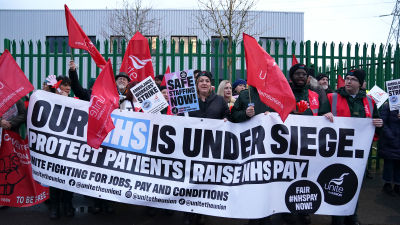Critical incidents declared at ambulance services and hospitals across country as strikes begin

Several ambulance services and NHS trusts have now declared critical incidents as the first of two days of strike action get underway.
As the strike launched on Wednesday, South Western Ambulance Service NHS Foundation Trust announced it had declared a critical incident.
It joined the North East Ambulance Service, South East Coast Ambulance Service and the East of England Ambulance Service, which all moved to critical status on Tuesday, on the eve of the walk out, under a wave of "unprecedented" pressure.
According to the services, they took the decision due to pressures including 999 call volumes and hospital handover delays, and that declaring the status allows them to instigate additional measures to protect patient safety.
The health and care system in Nottingham and Nottinghamshire - which includes East Midlands ambulance service - declared a critical incident on Tuesday, as did Portsmouth Hospitals University NHS Trust.
Fears are growing of the impacts that the first day of industrial action could have on trusts across England and Wales.
ITV News Political correspondent Harry Horton discusses whether the pressure is on the prime minister and Health Secretary Steve Barclay
Cornwall's health and care system is now operating at a critical incident level due to current operational pressures a spokesperson announced on Tuesday.
Unions have been left with no option but to consider further strike action if the government continues to refuse to budge on pay, according to Unison general secretary Christina McAnea.
Due to growing discontent, Rishi Sunak is now facing pressure from Tory backbenchers to back down and negotiate on pay with striking health workers.
Former Labour leader Jeremy Corbyn warned of the "utter desperation" of nurses, who completed a second 24-hour walkout in their tens of thousands on Tuesday.
Speaking in the Commons, he said: "They were there not through their wish to be out there, but because of their utter desperation of the situation they’re in at the present time – after seven years of inadequate pay rises, huge workloads and a huge loss of nursing numbers within the NHS."
What is a critical incident?
The ambulance service said declaring a critical incident allows it to instigate several additional measures to protect patient safety.
This includes seeking mutual aid, cancelling all training to allow for the redeployment of all clinical staff, no longer taking bookings for urgent non-emergency transportation and increasing third-party provider provision.
South East Coast Ambulance Service said it decided to declare a critical incident on Tuesday "following a period of more than a week of sustained pressure across our 999 and 111 services, significantly impacting on our ability to respond to patients".
The East of England Ambulance Service, declaring critical incident status in a statement on Tuesday, said it was "currently under huge pressure as a consequence of 999 call volumes and hospital handover delays".
"Declaring a critical incident means we can ensure our resources are focused on patients with the greatest need, as well as allow us to access wider support from our health and care partners," the trust said.
A spokesperson from NHS Cornwall and Isles of Scilly Integrated Care System said: "As a result of the acute pressure on all health and care services in Cornwall, we have escalated our operational level to a system critical incident."
They added they are seeing a high number of ambulances waiting outside hospitals and a surge in patient numbers - and expect this to worsen with planned industrial action this week.
Which areas are affected?
North East Ambulance Service operates across Northumberland, Tyne and Wear, County Durham, Darlington and Teesside; South East Coast Ambulance Service covers Brighton & Hove, East Sussex, West Sussex, Kent, Surrey and North East Hampshire; while the East of England Ambulance Service works in Bedfordshire, Hertfordshire, Essex, Norfolk, Suffolk and Cambridgeshire.
North East Ambulance Service said it declared a critical incident on Tuesday afternoon as a result of "significant delays for more than 200 patients waiting for an ambulance, together with a reduction in ambulance crew availability to respond because of delays in handing over patients at the region’s hospitals".
The health and care system in Nottingham and Nottinghamshire - which includes East Midlands ambulance service - declared a critical incident on Tuesday.
In a statement it said: "Our teams are continuing to work exceptionally hard, and we would like to reassure the public that despite the challenges faced, our services remain open for anyone who needs them."
Meanwhile, Portsmouth Hospitals University NHS Trust also declared a critical incident.
It said its emergency department was "full with patients that need admission" but that there was "limited space to treat patients with life-threatening conditions and injuries".
London Ambulance Service declared a "business continuity" incident on Tuesday, which it said was to help staff manage the situation.
Paramedics said they were "prioritising our sickest and most severely injured patients".
As strike action got underway on Wednesday, South Western Ambulance Service NHS Foundation Trust also declared a critical incident.
Stephen Segasby, chief operating officer at North East Ambulance Service, said: "Our service is under unprecedented pressure.
"Declaring a critical incident means we can focus our resources on those patients most in need and communicates the pressures we are under to our health system partners who can provide support.
"We are asking the public to call us only in a life-threatening emergency."
Mr Segasby urged other patients to speak to their GP or pharmacist or use the NHS 111 website.
"Our staff and volunteers continue to work extremely hard to respond to calls and incidents," he said.
"I would like to take this opportunity to thank them for their hard work and commitment at this challenging time."
Want a quick and expert briefing on the biggest news stories? Listen to our latest podcasts to find out What You Need To Know